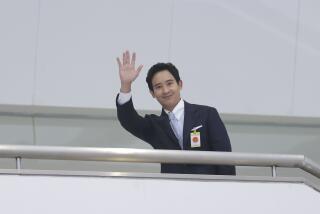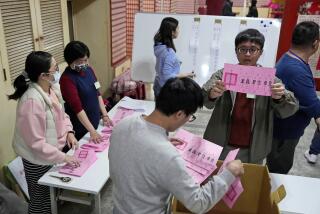An Election Is a Good Step, No Matter What the Outcome
- Share via
In the United States, many people are sure that Cambodia’s election Sunday will be fraudulent. If the United States concludes that this election is undemocratic, it can block Cambodia’s return to normal international relations--an undeserved tragedy for the Cambodian people. The State Department is trying to move the U.S. position closer to its Asian and European allies. But the consensus on Capitol Hill and in human rights groups remains punitive.
A Japanese peace plan launched in February broke an eight-month stalemate and laid the basis for an acceptable multi-party election. The main opposition leaders, Sam Rainsy and Prince Norodom Ranariddh, leader of the royalist party known as FUNCINPEC, returned from Thailand to campaign. A National Election Commission and two review bodies were created. According to the NEC, 39 parties and more than 90% of the eligible voters registered. There are outspoken print media; more than 40 newspapers are published in Phnom Penh. Access of opposition parties to radio and television was a problem until recently. Preelection violence so far is mercifully low, with fewer than six political killings since April. The Khmer Rouge has collapsed. Second Prime Minister Hun Sen and King Norodom Sihanouk have urged all Cambodians to vote freely. Hun Sen has pledged to step down if he loses.
Opinion polls published by French pollsters associated with Rainsy claim he has taken a lead over both his rivals; a June 16 poll reports that 14.3% of the people support Rainsy; 11.9%, Hun Sen; 5.3%, Ranariddh; and 67.2% remain “undecided.” Rainsy’s pollsters say most of the undecided will vote for opposition parties.
Yet major American commentators argue that this is all a big fraud: The truth is that Hun Sen, the Darth Vader of Cambodian politics, has sewn up the election by creating a climate of intimidation. He will continue to dominate Cambodia whatever the election result and the U.S. must continue to oppose him.
Why have such harsh views taken hold? Mostly because of Hun Sen’s pedigree. He belonged to the Vietnam-supported regime in Cambodia after Vietnam overthrew the Khmer Rouge regime. To our shame, throughout those years the West supported a royalist and Khmer Rouge resistance war, though thanks to Sidney Schanberg’s “The Killing Fields” we knew all about the Khmer Rouge crimes.
A U.N.-led peace process concluded in a 1993 free election. The close outcome made a coalition sensible and necessary. It worked initially, but broke down in 1996 due to rivalry between Hun Sen and Ranariddh.
Both leaders are equally responsible for its failure. The July 1997 war was not a Hun Sen coup. Hun Sen was, in effect, in charge of Cambodia anyway. The war was provoked by Ranariddh trying to change the military balance in Cambodia by secretly allying with outlawed Khmer Rouge forces. Recently leaked Khmer Rouge documents show that they planned to use Ranariddh to regain power, dumping him after the Cambodian People’s Party had been defeated.
Since the decisive July war, Hun Sen has been vilified in every way possible. Rainsy has become a persuasive advocate of the view that all is rotten in the state of Cambodia.
It’s sadly true that more than 100 killings of FUNCINPEC supporters took place after the war. Many were FUNCINPEC military or intelligence officers. None of the killers has been brought to justice. This is the main basis for allegations that a sufficient climate of intimidation exists to make this election fraudulent. Yet it’s evident that a real campaign is taking place. If Rainsy and Ranariddh truly believed that the election is a farce, they would not be taking part and trying to win.
But unless opposition parties gain huge and improbable landslide swings, Cambodia’s proportional representation system makes a multi-party coalition, including Hun Sen’s party in a major role, the likeliest outcome.
Obviously there will be election shortcomings in this poor Third World country with a history of political violence. But Cambodia is trying to run its first multi-party election as a sovereign state since the 1960s. The United States should welcome Cambodia back into the international community after the election, whatever its outcome. Continued boycotts will not help Cambodian democracy or the Cambodian people.
More to Read
Sign up for Essential California
The most important California stories and recommendations in your inbox every morning.
You may occasionally receive promotional content from the Los Angeles Times.













